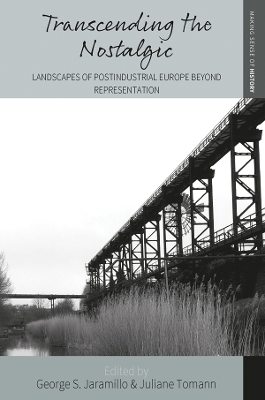
Transcending the Nostalgic
Berghahn Books (Verlag)
978-1-80073-221-6 (ISBN)
Even as the global economy of the twenty-first century continues its dramatic and unpredictable transformations, the landscapes it leaves in its wake bear the indelible marks of their industrial past. Whether in the form of abandoned physical structures, displaced populations, or ecological impacts, they persist in memory and lived experience across the developed world. This collection explores the affective and “more-than-representational” dimensions of post-industrial landscapes, including narratives, practices, social formations, and other phenomena. Focusing on case studies from across Europe, it examines both the objective and the subjective aspects of societies that, increasingly, produce fewer things and employ fewer workers.
George Jaramillo is a Historical Architect working at the Outer Banks of North Carolina in the United States. His work looks at climate change adaptation of historic structures and landscapes particularly due to sea level rise and storms. He uses heritage practices to study elements of industrial, rural and coastal landscapes to enable future development.
List of Illustrations
Preface
Introduction
George S. Jaramillo and Juliane Tomann
Part I: Postindustrial Ecologies
Chapter 1. War, Ruins and Wildness at Orford Ness
Sophia Davis
Chapter 2. Uneven Surfaces: Bodily Engagements with the Postindustrial Wild
Hilary Orange
Chapter 3. More-Than-Representational Postmining Landscapes in the Former Coal Regions of Eastern Germany: Between Economic Revitalization and Risk Society
Xaquín S. Pérez-Sindín
Part II: Performative Narratives
Chapter 4. Performing Imaginary Landscapes: Instagram Communities in the German Ruhr
Victoria Huszka
Chapter 5. Reshaping Remnants of the Recent Past in Transforming Swedish Mining Towns
Jennie Sjöholm
Chapter 6. KPGT: (Y)Utopia Revisited in a Sugar Mill
Irena Šentevska
Chapter 7. The ‘Not-Quite’ and Tuzla’s Invisible Buildings
Amanda Lawnicki
Part III: Reimagining Futures
Chapter 8. Made in Lincoln: Making Meaning of a Deindustrialized Landscape
Abigail Hunt
Chapter 9. The RiMaflow Project: A Laboratory to Study the New Cultural Meanings of Industrial Places
Dino Gavinelli, Eleonora Mastropietro and Giacomo Zanolin
Chapter 10. Refining the Heritage Narrative of Post-oil Landscapes
Carola Hein, Tino Mager, Stephan Hauser
Epilogue: A Coda for the ‘Left Behind’: Heritage and More-Than-Representational Theories
Emma Waterton
Index
| Erscheinungsdatum | 21.09.2021 |
|---|---|
| Reihe/Serie | Making Sense of History |
| Verlagsort | Oxford |
| Sprache | englisch |
| Maße | 152 x 229 mm |
| Themenwelt | Kunst / Musik / Theater |
| Geisteswissenschaften ► Geschichte ► Hilfswissenschaften | |
| Geisteswissenschaften ► Geschichte ► Regional- / Ländergeschichte | |
| Geschichte ► Teilgebiete der Geschichte ► Wirtschaftsgeschichte | |
| ISBN-10 | 1-80073-221-X / 180073221X |
| ISBN-13 | 978-1-80073-221-6 / 9781800732216 |
| Zustand | Neuware |
| Haben Sie eine Frage zum Produkt? |
aus dem Bereich


